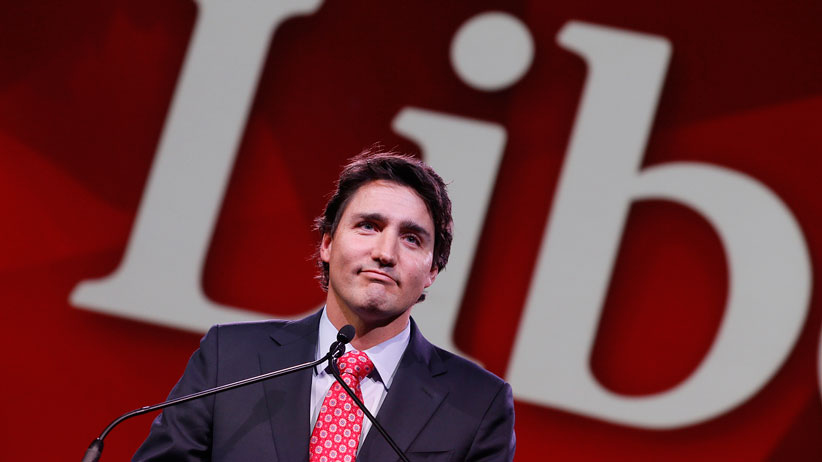Why Justin Trudeau is suddenly the underdog
Paul Wells on what Harper and Mulcair might have to teach Trudeau
Liberal leader Justin Trudeau gives his keynote address at the Liberal Biennial Convention in Montreal, February 22, 2014. Credit: Christinne Muschi/Reuters
Share

Listen to Paul Wells read his column, or subscribe to Maclean’s Voices for on-the-go listening:
Suddenly, Liberal Leader Justin Trudeau is the underdog. My evidence for this is slim, but I figured we might as well try to beat the rush here. Soon, you’ll be reading no end of “Justin Trudeau: toast?” headlines. There’s a mood in the land. And it’s been a while since the press gallery exhausted its last mood, which was, “Stephen Harper: Snap election, or resignation in disgrace?”
For a while there, the punditocracy was working on parallel and mutually contradictory theories. Some argued that the Prime Minister, worn down by scandal and fatigue, would quit politics while his party still has time to pick a successor before the election. Others claimed that a weird confluence of events, led by the Parliament Hill shootings on Oct. 22 and the Charlie Hebdo massacre in France, was giving the Conservatives a fleeting advantage they must exploit right away with a sudden election call. A few have managed to make both arguments at once.
But it’s getting late for an early election, and it’s even later for an orderly transition to post-Harperism. We may be headed toward something more prosaic: The election’s in autumn, and Harper will lead the Conservatives. This is even likelier, now that more people expect the Conservatives to win that election than the Liberals.
Here I table my slim evidence. In September, the Abacus polling firm found a 14-point gap between respondents who expected the Liberals to win the election, and those who thought the Conservatives would. It was 40-26 per cent for the Liberals (with the NDP at seven per cent). That advantage in expectations has steadily shrunk until, in a new poll this week, it vanished: Now, 34 per cent expect the Conservatives to win, compared to 33 per cent for the Liberals.
I have so many caveats. The Conservative advantage is within the margin of error. Polls testing respondents’ powers of psychic prediction have an even higher fun-to-utility ratio than other kinds. But a swing in perception has been steady over five months, and it’s closely matched by a (less spectacular) swing in declared voting intention: After many months of clear Liberal advantage, Trudeau’s party and Harper’s have been neck-and-neck now for two months in most polls.
And Trudeau has been getting brutal reviews. Pick an issue—his decision to withhold support from the intervention against Islamic State in Iraq; his decision to lure Eve Adams, a former Conservative, into the Liberal caucus; his handling of Liberal nomination contests in a handful of ridings—and most commentary in the papers has been bruisingly critical. One example is Carol Goar in the Toronto Star, who wrote last week that Trudeau’s nearly two years as Liberal leader has been “marred by misjudgments, ill-considered remarks and discarded promises.”
I was struck by the reaction to the column I published here last week, which tore several strips off Trudeau’s ambitious announcement of a national plan to put a price on carbon consumption. The column was widely read and shared on social media, but I’ve seen no attempt to rebut its criticisms. Something similar happened when he published a memoir last autumn. There was a lot in there that was worth debating, but nobody has seemed particularly interested in debating it.
It’s as though people don’t much care what he has to say. It’s as though politically involved Canadians view Trudeau, not as a question—Is he ready? Is he proposing interesting things?—but as a statement, a kind of totem. If you don’t like Harper, you need somebody to replace him and, for nearly two years now, Trudeau has looked like that somebody. If you’re protective of Harper, then Trudeau is a bogeyman, but again, that doesn’t actually have much to do with what he says or does.
The interesting question is what happens when Trudeau loses his aura of inevitability. Maybe nothing much. Under Trudeau, the Liberals are still more popular than they were under Michael Ignatieff after mid-2009. But until now, he was able to float on a tautology: He was popular, so if you wanted Harper defeated, you had to support the Liberals. Nor has the Liberals’ modest decline been matched by an uptick in NDP support. If anything, it looks more like disaffected Conservatives who’d drifted to the Liberals are drifting back. The Liberals are still, today, solidly placed to contend for power.
But if that five-month trend of declining belief in Trudeau’s inevitability continues, interesting things could happen. More of the 2011 Conservative vote, which has been wandering, could return home. More voters who were astonished to vote NDP in 2011 might astonish themselves again by preparing to repeat the gesture. Much will depend on what the leaders do and say.
Trudeau’s opponents know what it’s like to be in a real battle. When Harper became Canadian Alliance leader in 2002, the party was a national laughingstock. When Thomas Mulcair joined the NDP in 2007, the party had never won a seat in Quebec in a general election. They know what it’s like to be so far back, they can’t see the front. Of course, anyone who’s down can, at least theoretically, bounce back. Trudeau did surprise everyone in a boxing match a few years ago. This isn’t boxing.